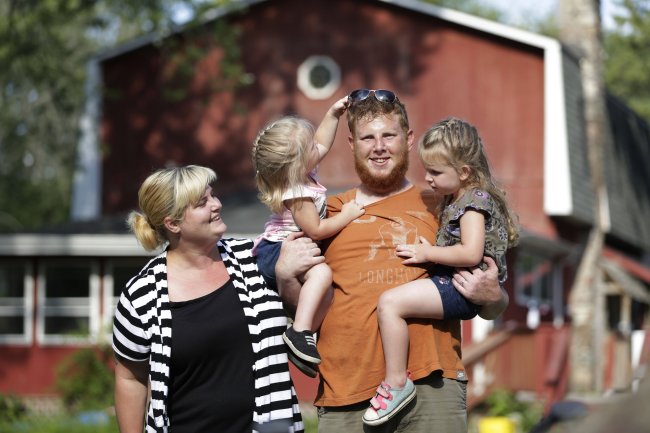CHICAGO ― A roadside bomb in Afghanistan left Israel Del Toro Jr. with third-degree burns over 80 percent of his body. He underwent 130 surgeries to reconstruct his body and face. After the grueling rehabilitation, he made peace with the fact that there were many things he would never do again.
But at a Chicago athletic competition for disabled veterans in 2011, a coach urged him to try powerlifting. Del Toro balked at first. The explosion had taken the fingers on his left hand, and most of the fingers on his right. He worried he wouldn’t be able to hold the bar.
Trust me, the coach said.
With two spotters ready and a crowd of competitors looking on, Del Toro balanced the bar on his palms and lifted 110 kilograms. Spectators erupted into cheers, and Del Toro went home with a first-place medal.
“For me, that was very emotional,” recalled Del Toro, 39. “I almost broke down because I thought I would never be able to do that again.”
His experience was one among many powerful moments at the Valor Games, a competition for disabled vets that debuted in Chicago in 2011 and has since expanded to San Jose, California; San Antonio; and Durham, North Carolina. The fourth annual Chicago competition kicked off at Soldier Field on Aug. 20.
Del Toro is now stationed at Lackland Air Force Base in Texas, where he works as a special-operations instructor. But he returned to his hometown of Chicago to compete at the recent games in powerlifting, cycling and the shot put and discus in his fourth Valor Games competition.
“My confidence just increased dramatically after that first Valor Games,” he said. “Usually, I’m the most severely injured guy. I see it as my duty or calling to help others who are there for the first time and who might feel nervous and might be thinking, ‘Maybe I can’t do it.’
“I want them to see that ‘Yes, you can do it, and we’ve got your back.’”
Organized by World Sport Chicago and in partnership with the U.S. Paralympics and the Department of Veterans Affairs, the Valor Games brings together wounded veterans and disabled active-duty service members for three days of athletic competition.
Under the unofficial motto “get active and get healed,” the event encourages veterans to challenge themselves physically, even after potentially devastating injuries. Participants include those with obvious conditions, such as amputations and blindness, but also those with posttraumatic stress disorder or brain injury.
 |
Justin Jackson poses with his wife, Heather Chapman-Jackson, and their daughters Dylan Jackson (left), 20 months, and Drew Jackson (right), 3, outside their home on Aug. 13. (Chicago Tribune/MCT) |
“We hope that Valor Games Midwest is not just three days of competition, but it’s something that the veterans take with them, that they get involved in sports year-round and, who knows, maybe that leads to greater fitness, greater recovery or even competing in higher-level competition,” said Stephanie Miller, director of school-based and Paralympic programs at World Sport Chicago.
To remove barriers and encourage participation, the Valor Games cover the costs of lodging, meals and local transportation. The event also offers seminars to help veterans and their families connect with services. Attendance has increased annually, organizers say, with more than 200 veterans and active-duty personnel expected to compete in Chicago at the latest event, compared with 80 in 2011.
“The interest grows each year,” Miller said. “There’s a huge need to provide services for veterans.
“This is a very open and friendly way to get involved in sports. Our athletes are extremely competitive, of course, but we have athletes who are just starting to get involved in sports, as well as those who have been involved in sports for years.”
Fitness can be a powerful force, organizers say, not only to promote physical strength but also to combat feelings of depression and isolation that are common after a life-changing injury.
That was true for Wesley Perkins, 43, who ― after a yearlong deployment in Iraq ― struggled with nightmares and avoided driving his car because it triggered memories of driving truck convoys in Baghdad. After coming home in 2004, Perkins spent much of his time confined to his house and was eventually diagnosed with PTSD. He ended up at the Valor Games in 2011 after being pushed to attend by acquaintances in a veterans support group.
Competing alongside other veterans, he found a sense of camaraderie and support. He also won a gold medal in powerlifting, an achievement that, he said, “showed me my potential.” Now convinced that exercise eases his anxiety, Perkins goes to a gym six days a week for what he calls “iron therapy.”
“I’m very secluded due to my PTSD. The Valor Games gave me a goal to look forward to not only to see my fellow vets but also to train for,” said Perkins, of suburban Lisle.
Likewise, Justin Jackson, 29, of suburban Ingleside, returned from two tours in Iraq and found himself haunted by the war. “At one point I tried drinking myself to death,” he said. He eventually pulled himself out of that tailspin, married, had two children and left the military.
By Colleen Mastony
(Chicago Tribune)
(MCT Information Services)








